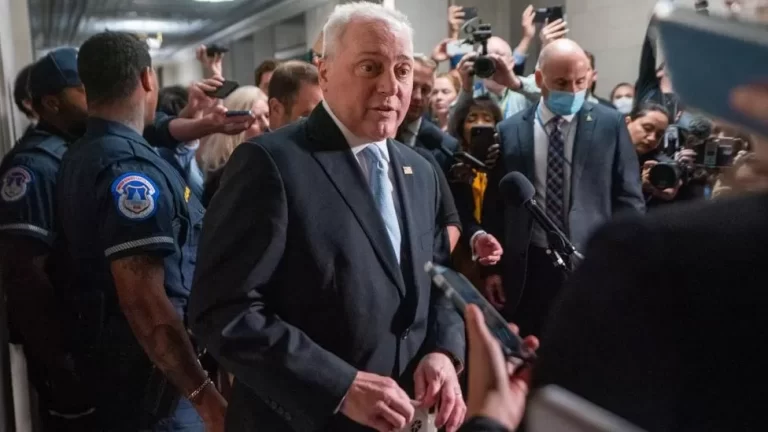Republicans have picked Steve Scalise as their choice to be the new Speaker of the House of Representatives after a secret vote.
He beat the other candidate, Jim Jordan, 113 votes to 99, in a closed-door meeting at the US Capitol. The Speaker is one of the most important posts in the US government, running the lower chamber of Congress.
There will now be a vote of the full House where a simple majority of votes, 217, is required to win the job. The House was adjourned on Wednesday evening as Mr Scalise scrambled to find enough votes in his party.
It is unclear when the House will be called back for a floor vote, with acting Speaker Patrick McHenry saying “we'll see” when asked about it. Mr McHenry said that Mr Scalise “has the right to put his votes together for the floor and make sure the timing is right… we're going to let that happen”.
Kevin McCarthy was ousted from the position after right-wing party members revolted and removed him, a move unprecedented in US politics. Speaking to reporters after the secret vote, Mr Scalise said that filling the Speaker role was vital in an increasingly “dangerous world”.
“We need to make sure we're sending a message… that the House is open.” On the Democrats' side, representatives will put forth New York's Hakeem Jeffries as their candidate for the Speaker position.
But as the minority party their choice for Speaker has little chance of reaching the magic number of 217. The Republican Party has been plagued by infighting in recent weeks and had seemed unable to reach an agreement on Mr McCarthy's replacement.
The narrowness of Mr Scalise's victory highlights the divisions within the party, and some lawmakers have expressed scepticism that, even now, he has the votes necessary to secure the Speaker position. Among those still opposing him is Kentucky's Thomas Massie, who told reporters that he is a “hard no”, at least in the initial vote, because of disagreements with Mr Scalise on how the budget should be handled.
Mr Massie added that he believed that at least 20 other Republicans would also vote against Mr Scalise, significantly more than the five votes he could afford to lose.
Several other Republican representatives, including Colorado's Lauren Boebert, Georgia's Marjorie Taylor Greene and Florida's Anna Paulina Luna, have said they do not intend to vote for Mr Scalise. Texas Congressman Chip Roy has said he too he is a “hard no” for now because the vote was “rushed” to the floor.
“There are a number of votes that are very much in question for Steve,” he said. “I don't think it's a good idea for us to be barreling towards the floor.”
Mr Scalise was much more the traditional candidate in this race. He worked his way up through the party's leadership, built a reputation as a formidable fundraiser and tried to build connections to the party's full range of interest groups and constituencies.
Jim Jordan was the outsider, who rose to fame with conservative television appearances, bombastic rhetoric and confrontational speeches in committee hearings. Mr Jordan was also endorsed by Mr Trump, which in the end wasn't enough to put him over the top.
One of the anti-Scalise Republicans, Texas' Troy Nehls, cited the former president's endorsement as a reason he still planned to vote for Mr Jordan.
“That's what Donald Trump wanted,” he said.
Mr Scalise's victory suggests that, when the doors are closed and the ballots are secret, the former president's influence within the party – at least in the House of Representatives – is not as strong as his polling popularity might indicate.
His work is far from done, however. Now he has to make sure at least 217 of the 221 Republicans back him when the full House convenes to vote on speaker. The narrowness of the Republican majority was former speaker Kevin McCarthy's undoing.
Mr Scalise will have to demonstrate a political deftness if he wants to avoid a similar fate.
— CutC by bbc.com


